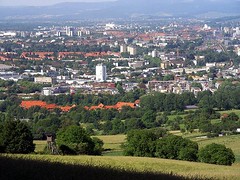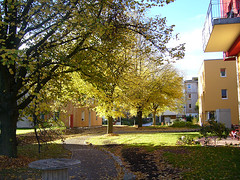Life without cars in Vauban, Germany

Posted May 13, 2009 at 1:27PM
Elisabeth Rosenthal writes in yesterday's New York Times how Vauban, a suburb of Freiburg, Germany, is seeking to create a car-free community. Here's an excerpt:
"Residents of this upscale community are suburban pioneers, going where few soccer moms or commuting executives have ever gone before: they have given up their cars.
"Street parking, driveways and home garages are generally forbidden in this experimental new district on the outskirts of Freiburg, near the Swiss border. Vauban's streets are completely 'car-free' - except the main thoroughfare, where the tram to downtown Freiburg runs, and a few streets on one edge of the community.
Car ownership is allowed, but there are only two places to park - large garages at the edge of the development, where a car-owner buys a space, for $40,000, along with a home.
"As a result, 70 percent of Vauban's families do not own cars, and 57 percent sold a car to move here. 'When I had a car I was always tense. I'm much happier this way,' said Heidrun Walter, a media trainer and mother of two, as she walked verdant streets where the swish of bicycles and the chatter of wandering children drown out the occasional distant motor . . .
"While there have been efforts in the past two decades to make cities more dense and better for walking, planners are now taking the concept to the suburbs and focusing specifically on environmental benefits like reducing emissions. Vauban, completed in 2006 and home to 5,500 residents within a rectangular square mile, may be the most advanced experiment in low-car suburban life.
But its basic precepts are being adopted around the world in attempts to make suburbs more compact and more accessible to public transportation, with fewer parking spaces . . .
"In Europe - which planners agree is further along than America - some governments are thinking on national scale. From 2000 to 2005, Great Britain undertook a comprehensive effort to reform national planning, which was intended to discourage car use by requiring that new development be accessible by public transit.
"'Development comprising jobs, shopping, leisure and services should not be designed and located on the assumption that the car will represent the only realistic means of access for the vast majority of people,' said PPG 13, the British government's revolutionary 2001 planning document. Dozens of shopping malls, fast-food restaurants and housing compounds have been refused planning permits based on the new regulation . . .
"Life in a car-reduced place like Vauban has it own unusual gestalt in the country that is home to Mercedes-Benz and the autobahn. It is long and relatively narrow, so that the tram into Freiburg is an easy walk from every home.
Stores, restaurants, banks and schools are more interspersed among homes than they are in a typical suburb. Most residents, like Ms. Walter, have carts they haul behind bicycles for shopping trips or children's play dates.
"For trips to stores like IKEA or ski slopes, families buy cars together or use communal cars rented out by Vauban's car-sharing club . . ."
Go here for the full article. Many thanks to John Holtzclaw for pointing me to it.

